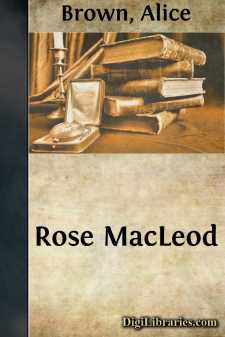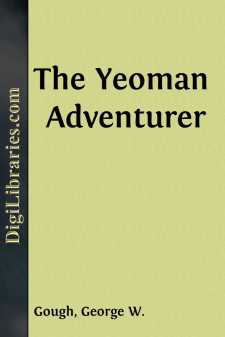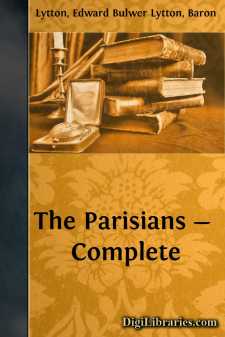Categories
- Antiques & Collectibles 13
- Architecture 36
- Art 48
- Bibles 22
- Biography & Autobiography 813
- Body, Mind & Spirit 138
- Business & Economics 28
- Children's Books 12
- Children's Fiction 9
- Computers 4
- Cooking 94
- Crafts & Hobbies 4
- Drama 346
- Education 46
- Family & Relationships 57
- Fiction 11821
- Games 19
- Gardening 17
- Health & Fitness 34
- History 1377
- House & Home 1
- Humor 147
- Juvenile Fiction 1873
- Juvenile Nonfiction 202
- Language Arts & Disciplines 88
- Law 16
- Literary Collections 686
- Literary Criticism 179
- Mathematics 13
- Medical 41
- Music 40
- Nature 179
- Non-Classifiable 1768
- Performing Arts 7
- Periodicals 1453
- Philosophy 64
- Photography 2
- Poetry 896
- Political Science 203
- Psychology 42
- Reference 154
- Religion 505
- Science 126
- Self-Help 81
- Social Science 81
- Sports & Recreation 34
- Study Aids 3
- Technology & Engineering 59
- Transportation 23
- Travel 463
- True Crime 29
Rose MacLeod
by: Alice Brown
Description:
Excerpt
Madam Fulton and her granddaughter Electra were sitting at the breakfast-table. It was a warm yet inspiriting day in early spring, and, if the feel and look of it were not enough, the garden under the dining-room windows told the season's hour like a floral clock. The earliest blossoms had been pushed onward by the mounting spirit of the year, and now the firstlings of May were budding. The great Georgian house, set in the heart of this processional bloom, showed the mellow tints of time. It had an abundant acreage, diversified, at first hand, not only by this terraced garden in the rear, but by another gone to wild abandon on the west, and an orchard stretching away into level fields and, beyond them, groves of pine.
These dining-room windows, three of them, side by side, and now unshaded, gave large outlook on a beautiful and busy world where the terrace mounted in green, to be painted later with red peony balls, and where the eye, still traveling, rested in satisfaction on the fringe of locusts at the top.
Inside the house the sense of beauty could be fully fed. Here was a sweet consistency, the sacred past in untouched being, that time when furniture was made in England, and china was the product of long voyages and solemn hoarding in corner cabinets with diamond panes. Life here was reflected dimly from polished surfaces and serenely accentuated by quaint carvings and spindle legs. Here was "atmosphere"—the theatre of simple and austere content.
Madam Fulton outwardly fitted her background as a shepherdess fits a fan. She was a sprite of an old lady, slender and round, and finished in every movement, with the precision of those who have "learned the steps" in dancing of another period. It was her joy that she had kept her figure, her commonplace that, having it, she knew what to do with it. She had a piquant profile, dark eyes, and curls whiter than white, sifted over with the lustre of a living silver. According to her custom, she wore light gray, and there was lace about her wrists and throat.
"Coffee, Electra?" she suddenly proposed, in a contralto voice that still had warmth in it. She put the question impatiently, as if her hidden self and that of the girl opposite had been too long communing, in spite of them, and she had to break the tacit bondage of that intercourse by one more obvious. The girl looked up from the letter in her hand.
"No, thank you, grandmother," she said. Her voice, even in its lowest notes, had a clear, full resonance. Then she laid the letter down. "I beg your pardon," she added. "I thought you were opening your mail."
"No! no!" Madam Fulton cried, in a new impatience. "Go on. Read your letter. Don't mind me."
But the girl was pushing it aside. She looked across the table with her direct glance, and Madam Fulton thought unwillingly how handsome she was. Electra was young, and she lacked but one thing: a girl's uncertain grace. She had all the freshness of youth with the poise of ripest womanhood. She sat straight and well, and seemed to manage her position at table as if it were a horse. Her profile was slightly aquiline and her complexion faultless in its fairness and its testimony to wholesome living. Her lips were rather thin, but the line of white teeth behind them showed exquisitely. She had a great deal of fine brown hair wound about her head in braids, in an imperial fashion. Perhaps the only fault in her face was that her eyes were of a light and not sympathetic blue.
"Shall I open your mail, grandmother?" she asked with extreme deference.
Madam Fulton's hand was lying on a disordered pile of letters, twenty deep, beside her plate. She pressed the hand a little closer.
"No, thank you," she said. "I will attend to them myself."
Electra laid down her napkin, and pushed her plate to one side, to give space for her own papers....


















